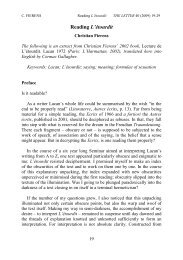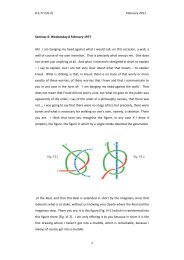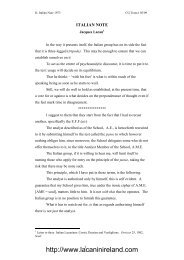LE PARI DE PASCAL - PASCAL'S WAGER ... - Lacan in Ireland
LE PARI DE PASCAL - PASCAL'S WAGER ... - Lacan in Ireland
LE PARI DE PASCAL - PASCAL'S WAGER ... - Lacan in Ireland
You also want an ePaper? Increase the reach of your titles
YUMPU automatically turns print PDFs into web optimized ePapers that Google loves.
or gap that exists <strong>in</strong> the big Other, that <strong>Lacan</strong> def<strong>in</strong>ed, at least at that time -<br />
not yet as a lack of sexual relation (il n'y a pas de rapport sexuel) - but a lack<br />
of sexual signifiers or the sexual signifier.<br />
So now for the wager! We won't go over the argument already<br />
heard this morn<strong>in</strong>g. 1<br />
Just let us remember that the bet <strong>in</strong> this wager is your life - a life<br />
worth noth<strong>in</strong>g - and that the stake is an <strong>in</strong>f<strong>in</strong>ity of lives that are <strong>in</strong>f<strong>in</strong>itely<br />
happy. Furthermore, as <strong>Lacan</strong> notes, as <strong>in</strong> gam<strong>in</strong>g the bet is lost from the<br />
outset.<br />
So he identified this lost bet, he identified it to the little o object<br />
(Vobjet petit a) 2 , the lost object, and to the loss of additional or surplus or<br />
extra enjoyment<br />
] plus-de-jouir\<br />
It is <strong>in</strong> this sem<strong>in</strong>ar that <strong>Lacan</strong> baptizes the surplus enjoy<strong>in</strong>g -<br />
surplus value to the o object. He gives it an extra or different name<br />
(Supplemental) - surplus enjoy<strong>in</strong>g, which has a parallel <strong>in</strong> the notion of<br />
surplus value <strong>in</strong>troduced by Marx (as talked about earlier <strong>in</strong> the<br />
presentation by Patricia McCarthy). 3<br />
So then <strong>in</strong> this wager we are committed or engaged as Pascal says,<br />
we are start<strong>in</strong>g off, we are en route. There is no way - despite the<br />
objections of any <strong>in</strong>terlocutor <strong>in</strong> the wager - there is no way of not bett<strong>in</strong>g.<br />
And we should note that the <strong>in</strong>terlocutor <strong>in</strong> question <strong>in</strong> this part of the<br />
Pensees is Pascal himself; it is not at all some Libert<strong>in</strong>e that he is supposed<br />
to be address<strong>in</strong>g.<br />
Is there a difference between gam<strong>in</strong>g and a wager Undoubtedly<br />
there is: a game or gam<strong>in</strong>g consists <strong>in</strong> bett<strong>in</strong>g, <strong>in</strong> other words accept<strong>in</strong>g<br />
from the start the loss of the stake (which <strong>Lacan</strong> here sees as the o object)<br />
1 This is a reference to Cormac Gallagher's discussion of the wager <strong>in</strong> his overview of<br />
<strong>Lacan</strong>'s sem<strong>in</strong>ar From an Other to the other. This is conta<strong>in</strong>ed <strong>in</strong> this issue of THE <strong>LE</strong>TTER.<br />
The paper was given dur<strong>in</strong>g the morn<strong>in</strong>g session of the APPI congress (when we were<br />
just wak<strong>in</strong>g up!). ED.<br />
2 Claude Landeman used the expressions 'objet petit a' and 'objet a' throughout. These<br />
were translated by 'little o object' and 'o object*.<br />
3 Patricia McCarthy's contribution to the congress is to be found <strong>in</strong> this issue of THE<br />
<strong>LE</strong>TTER.<br />
115














